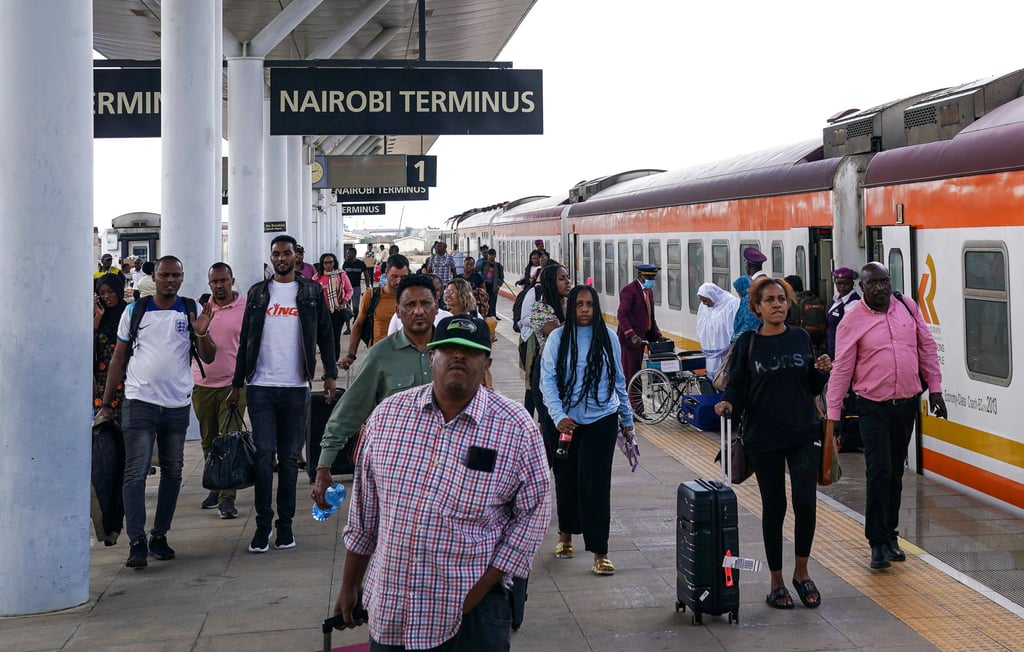According to the president’s office, Ruto said discussions were advanced over the construction of the Rironi-Mau Summit road, a project taken from French firms that had initially won the contract to build the dual carriageway.
A French consortium won a US$1.4 billion contract to build the 233km (144-mile) Rironi-Naivasha-Nakuru-Mau Summit Road during the previous Kenyan administration of Uhuru Kenyatta but the Ruto administration cancelled the deal when it came to power in 2022, saying it was costly.
China Exim Bank funded the 590km first phase of the railway, built by China Road and Bridge Corporation (CRBC) and its parent firm China Communications Construction Company, for more than US$5 billion.
The railroad runs from the coastal city of Mombasa to Nairobi with an extension to Naivasha in the Central Rift Valley. However, the railway’s construction ended abruptly in Naivasha after China Exim Bank pulled the plug on financing the extension to Malaba without a new commercial viability study.
The highway and SGR projects featured in talks with Chinese President Xi Jinping when Ruto visited Beijing during the Forum on China–Africa Cooperation (FOCAC) in September.
“Swift project implementation will create jobs, especially for our youth and women,” Ruto said following the talks with Li Xi on Monday.
On Sunday, Li visited the SGR Nairobi terminus, where he spoke with Kenya’s transport ministry officials on the possibility of funding the SGR leg to the Ugandan border. At the terminus, the Chinese delegation held a closed-door preliminary project assessment meeting with senior government officials.

According to Kenya’s transport ministry, the construction of the 475km SGR extension to Malaba via Kisumu will start next year and is estimated to cost around US$5 billion and take four years to complete.
Li, who is also head of the Communist Party’s anti-corruption department, said China was committed to implementing the agreements reached between Xi and Ruto during the FOCAC summit.
“China will work with Kenya to support programmes and projects in line with Vision 2030,” Li said of Kenya’s ambition to raise the average standard of living to middle income.
Li emphasised China’s support for a people-centred approach to national development, including the provision of quality education and healthcare, job creation and environmental protection and preservation.
On Monday, Li met officials from Kenya’s ruling United Democratic Alliance (UDA) and pledged China’s aid to build a leadership academy or party school as part of Beijing’s soft power push to promote its development model and ideology on the continent.
“The CPC leader undertook to partner with UDA, especially on setting up … a leadership academy, during the bilateral talks between the leaders from the two political outfits,” the UDA said in a statement released after the talks with Li.
Kenya joins a growing number of African countries that have approached China’s Communist Party to build their schools and strengthen party building. UDA officials said it sought to learn from Communist Party successes in political party building.
UDA chairwoman Cecily Mutitu Mbarire said: “Ours is an outfit just on the take-off, but with aspirations to be a movement that will outlive every one of us and stand the test of time, as the CPC has done.” She said the party school would help further party ideologies “now and in the future”.
“It will help instil discipline in how we conduct our politics,” Mbarire, who is also the governor of Embu County northeast of Nairobi, said in the meeting with Li. “We know these are some of the tenets that have brought the CPC this far and we want to emulate them, so we seek your support in establishing this academy.”
China-Africa specialist David Shinn, a professor at George Washington University’s Elliott School of International Affairs, said China saw this as an inexpensive way to build personal relationships with key leaders in Africa.
He said the Communist Party had a long and close relationship with South Africa’s African National Congress (ANC). It was now trying to build strong ties with the UDA in Kenya, especially following Ruto’s successful visit this year to Washington where President Joe Biden elevated Kenya to “major non-Nato ally” – perceived as a response to China’s growing influence in East Africa.
“In addition to building personal relationships, China is encouraging African political parties to consider the CPC governance model or, at least, elements of it,” Shinn said.
He said China’s financing and support of the Mwalimu Julius Nyerere Leadership School in Tanzania for the ruling parties of six countries in southern Africa was part of this effort.
“The evidence suggests that, up to a point, the CPC is having success in gaining acceptance for elements of its governing model,” Shinn said.
Before arriving in Nairobi at the weekend, Li Xi visited Italy last week where he met Senate President Ignazio La Russa, and Deputy Prime Minister and Foreign Minister Antonio Tajani in Rome.
From Nairobi, Li is set to visit South Africa at the invitation of the ANC, with the three-nation tour ending on Friday.
According to Lina Benabdallah, an associate professor in the politics and international affairs department at Wake Forest University in the US, the Communist Party has maintained strong networking relations with political parties across the continent.
“There are frequent meetings, visits and exchanges that keep these ties going. The diversity from Italy to South Africa and Kenya also shows the openness with which the CPC treats these party-to-party relations,” she said.
Benabdallah said China had for years held training seminars about public administration, tax collection and other governance-related training.
“Even sharing Covid-19 best practices is related to governance in some ways.”
Discussion about this post